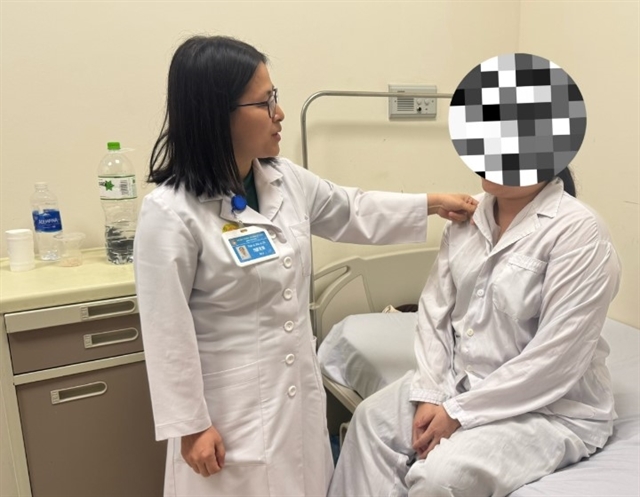 Society
Society


|
| Doctor Phạm Thị Thu talks with a patient at the department. — Photo hocvienquany.vn |
Nguyễn Hà
HÀ NỘI — At the Psychiatry Department of Military Hospital 103, the days are long, the work is intense and the emotional toll is heavy, particularly for the few women among the medical staff.
Out of 30 healthcare professionals in the department, only three are female doctors and three are female nurses. That imbalance means women often carry a heavier load, says Department Director Bùi Quang Huy.
"If male staff give 100 per cent, female staff have to give 200 or 300 per cent," he said. "They also have responsibilities as mothers and caregivers at home.
"Caring for psychiatric patients is much more demanding for women. They need to love the job, be patient with the work and get used to the pressure," he added.
One of those women is Doctor Phạm Thị Thu, who joined the department in 2017. She admits she was afraid at first - intimidated by the erratic behaviour of patients - but over the years, she has developed her own ways to deal with aggression and unpredictability.
"I chose psychiatry during medical school because it was different," she said. "You diagnose it based on clinical symptoms - there are no lab tests.
"It’s genetic in origin, but many people think it’s caused by possession or stress. That stigma keeps patients from getting treated until things get really bad. I feel sorry for them," she added.
Thu recalled speaking with a female patient who had suddenly stopped taking her medication.
"Why did you quit?" she asked.
"I didn’t want to take it anymore," the woman replied.
Thu gently warned that skipping medication could cause relapses and make recovery harder.
"If the meds make you uncomfortable, tell me so we can adjust. But you need to take them regularly, so you can go back to work and take care of your mother and child," she said.
The patient nodded in agreement.
Another case involved a woman from Quảng Bình Province diagnosed with schizophrenia and delusions. After giving birth to her second child, she reported hearing voices and seeing visions of deceased relatives.
"She’d sit and laugh alone, unable to do anything," her mother said. "We tried spiritual treatments, but nothing worked. Since coming here, she’s improved significantly - and it’s only been about a month."
Most patients at the department are between 15 and 50 years old. The department currently treats 94 inpatients and sees up to 80 outpatients daily. On any given day, there are usually 80 to 120 patients in the ward.
Every patient, Thu said, has their own unique story. While medication is essential, psychological support plays an equally important role. Doctors and nurses closely observe patients’ behaviour and try to connect with them, helping them feel safe enough to talk.
"Sometimes I dream that patients who never speak suddenly open up to me," Thu said. "But when I rush to check on them the next day, they’re still silent. It’s heartbreaking."
In some cases, patients leave the hospital without permission. Thu once roamed the streets of Hà Nội, stopping strangers to check if they were her patients.
Still, the progress of patients makes the hardships worthwhile. She recalled one patient who had attempted suicide and severed their own muscles.
After surgery and psychiatric treatment, including electroconvulsive therapy, the patient recovered, resumed a normal life and recently got married.
"People are afraid of mental illness, but it’s not as terrifying as they think." she said. "With the right care and family support, patients can recover."
Nurse Trần Thị Thanh Phương has been working at the department for nearly 20 years. Her job includes administering medications and ensuring patients take them, a task that requires vigilance.
"Some try to hide their pills between their fingers or under their tongues, or they pretend to swallow and spit them into their water cups," she said. "But we’ve seen it all."
Her daily shift runs from 7am to 4.30pm, distributing medication, giving injections, supporting doctors during procedures and assisting with electroshock therapy.
"Every job is tough, but I’m lucky my family supports me," she said. "That gives me the strength to keep going."
But not every patient responds to kindness.
"Sometimes I have to raise my voice. Outsiders don’t understand, but that’s the only way some patients will listen. You have to adapt your behaviour constantly," she added.
Even with rising patient numbers, she says the job remains fulfilling. When someone is discharged and sings or recites poetry to thank the staff, it makes everything worthwhile.
Huy believes female staff bring unique strengths to the department as their natural gentleness helps even the most aggressive patients calm down.
Still, working in psychiatry comes with risk. Medical staff are often insulted, threatened or even chased during patients’ outbursts.
"There are times when people have had to run for their safety," Huy said.
But despite the challenges, he credits the compassion, resilience and commitment of his team for helping patients recover and reintegrate into society.
"With empathy and love for the profession, our doctors and nurses have helped many patients reclaim their lives," he said. — VNS




